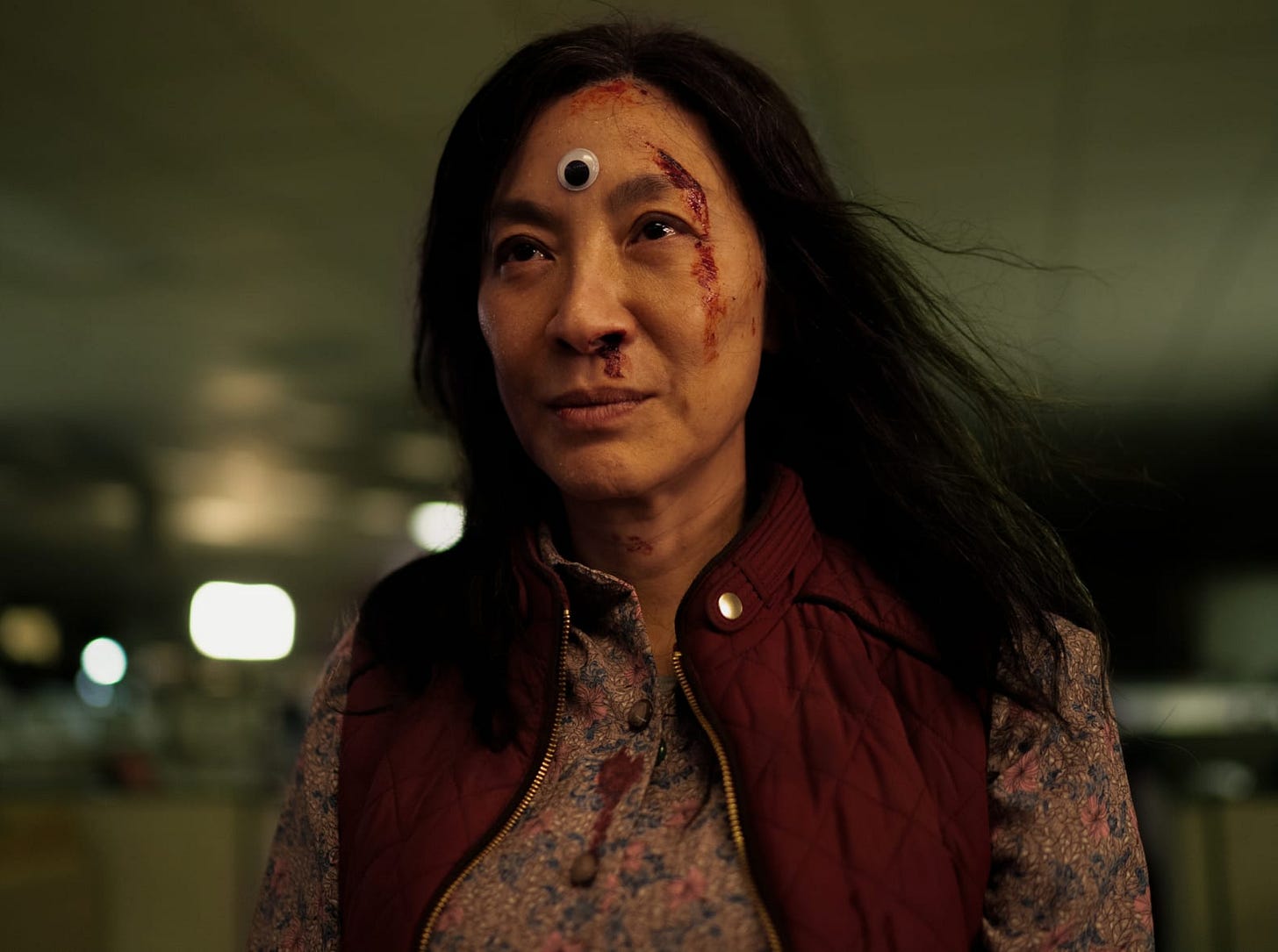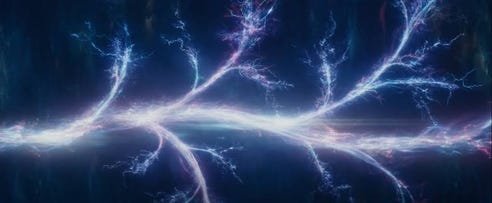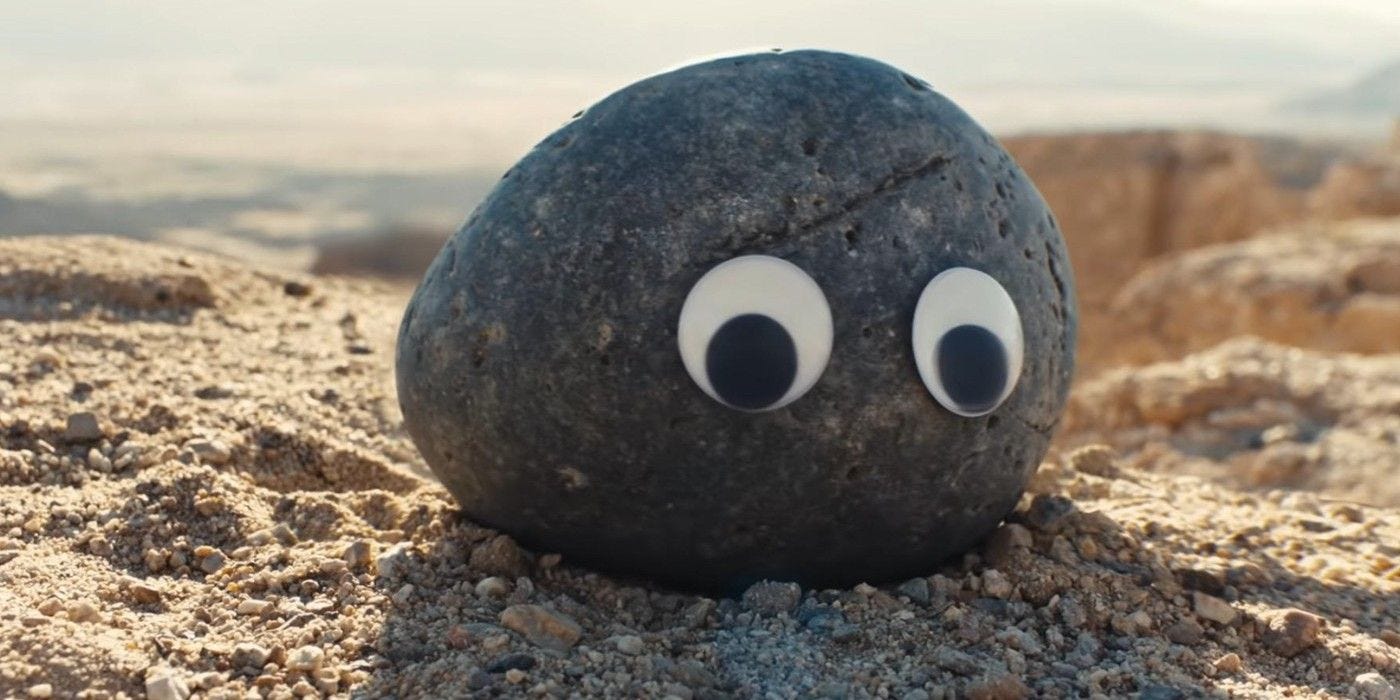Everything Everywhere...Right Now
What the presumptive Best Picture winner tells us about our current moment.
Image credit: The Atlantic
“Every new discovery is just a reminder…we’re all small and stupid.”
As I sit writing this, Everything Everywhere All At Once, a remarkable genre film about Evelyn, a middle-aged Chinese immigrant who runs a laundromat with her husband Waymond, is poised to have a historic Oscar night. All leading indicators and precursor awards are tipped to favor the film, which has gone from surprising indie to dominant force in a way that is still a bit head-spinning. Much handwringing in the critic class is devoted to whether or not a film that has multiple sex toy jokes, a singing raccoon, and hot dog fingers can really be our next Best Picture winner, but set aside pearl clutching and shock, and the traditional family drama at the heart of (and giving heart to) the film is simply a crowd-pleaser. Instead of wading into those uncomfortably full waters, I instead want to form this post around a question I was asked recently on my Wheel of Time read-along podcast[1]: Why is pop culture so obsessed with multiverse stories right now?
This question is going to naturally have a varied array of answers depending on the particular story, creator, or perhaps most important of all, intellectual property. Yet taken on the whole, it seems clear that multiversal storytelling is not just the defining quality of so much entertainment in 2022-2023, but it will be a shaping force for the next few years as Marvel, DC, and >gasp< non-franchise filmmakers seem interested in exploring the concept and the storytelling opportunities it provides. Mythology and stories always reflect the needs of their current cultural moment, but is this turn toward the multiverse a great evolution for fulfilling these goals, or is it an off-shoot with a limited shelf life—a variant that won’t ultimately survive beyond this moment? I want to traipse across a few of these parallel dimensions here to see what answers or further questions can be found.
“You don’t get one of these unless you’ve seen a lot of bullshit.”
First let’s dispense with the most cynical (although perhaps the most likely) reason for the turn to the multiverse: extending the lives of film and television franchises to consume even more of our time and attention. Setting aside the wholly original case of Everything Everywhere, the multiverse turn in both the DC and Marvel universes appears to be an effort to resuscitate characters and brands that would otherwise need to be shelved for creative (and talent contract) reasons.
The strongest recent example of this would be the flagging DC extended universe which, since its very inception, has had a response that is critically mixed at best. Now, years later, and under the weight of not just the whole Snyder Cut culture, but also under the weight of the crimes and misdeeds of its star Ezra Miller, comes the Flash, a film that Warner Brothers is determined to maintain in its soft reboot of the DC films. If that sentence alone didn’t give you fatigue, count yourself as lucky. The textual and extra-textual valences of the film make it hard to imagine that really any narrative could overcome that to find success. So, what’s a studio/cable channel[2] to do? Multiverse it! When the splashy Super Bowl commercial arrived for the film, the chat about all these complications dissipated, at least momentarily, for the awe of seeing Michael Keaton return as Batman, reminding you that what’s good here is that the story you already love (not the one you kind of hate) is going to continue.
Indeed, for DC in particular, this seems to be a way for them to have their cake and eat it too. Why have one successful Batman franchise when you can have three? Why let one surprisingly effective film (Joker) get in the way of bringing that character to other franchises? Multiverse equals money in these hands, and we can’t ignore that as a driving force. As consumers, we are, of course, left to pick and choose our favorite universes, but the reality of the planned interweaving seems to be that “real fans” will take them all in.
Lest I get accused of comic bias, I will add that Marvel too seems guilty of exploiting the multiverse to extend the life of characters and certainly cash in on older pieces of their franchises. Hey, wasn’t Tom Hiddleston great as Loki? Let’s break him off into his own dimension-hopping adventure. What if instead of three Spider-man franchises we fold them into one? Sure, it’s a great story, but also note how the sales of the Tobey Maguire and Andrew Garfield back catalog suddenly spiked all last Winter.
I’m not going so far as to saw that money is the sole or even the primary driving force on these decisions, but to forget the second word in the name show business would be to deny the essence of this industry.
Image Credit: Parade Magazine
“Every rejection, every disappointment has led to this moment.”
As noted in the introduction, mythology and story are best understood in the context of the culture and moment that create them. Indeed, in our art and our creativity, we express an idea of who we are and what we need in any given moment, and across our culture. So, what might the multiverse be responding to within our current moment?
The clever joy of Everything Everywhere may be in its genre-bending Wachowski meets Vonnegut premise, but the beating heart of the film relies on the solid 20 minutes at its opening that first establishes the world of Evelyn and the set of pressures that she is under. In short succession, we see the difficulties of managing a busy household, the financial (and tax) burdens of running a small business, the hardship of maintaining a healthy marriage, the inter-generational pressures coming at her from below (Her daughter, Joy) to be more progressive and accepting and from above (Her father ,Gong Gong) to uphold family traditions. It’s a complicated set of pressures expressed in crystalline simplicity with the first of the film’s chapter cards: “EVERYTHING.”
While each of these pressures has a particular valence to the lived experience of immigrant families, Asian families, and the lives of women, there’s something deeply universal to our current cultural moment that makes the film incredibly relatable. Since the 2020 pandemic, the ways in which the personal, familial, and professional duties that we each must fulfill have been made manifest like never before. Modern life is complicated and when the borders between work/family/parenthood/personal/political became porous to the point of collapsing, all of us became travelers in our own multiverse, swapping between our identities moment to moment or seeing those selves overlap.
It seems then like no surprise that the film found an immediate and nearly universal acclaim from critics and audiences. The multiverse within us finds expression in the sharp cuts, editing together sometimes single frames from various Evelyn’s and layering them so fast as to literally and figuratively blur them. In how any one shot could be its own narrative, we sense the hidden depths and the selves we could be ourselves if the demands of multitasking could ease up. To be any one of our selves seems like a luxury no one can afford.
Around the film’s midpoint, Alpha Waymond (the Morpheus to our Evelyn’s Neo) realizes what it is that is driving Evelyn’s heroism in this universe, which is that she has tried and failed at so many pursuits. Unlike her other selves, this Evelyn hasn’t achieved anything and thereby is a fertile template in which to write the skills and lessons of those other selves. Put as simply as Alpha Waymond to Evelyn: “You’re living your worst life.” While delivered comedically, the lesson here resonates with so many of us who feel that any impulse toward self-improvement or our best selves gets lost in the shuffle of our daily lives. Per Joseph Campbell, traditional heroes have to let go of the concerns of the everyday world in order to be heroic, but Evelyn is a direct inversion of this: because she never let go of those concerns, she is powerful.
It’s hard to imagine a better fantasy for us all to escape in: our heroism is not the life we’d live without the common concerns, but it is the life we can lead because of them. We want that reassurance that we aren’t filling our lives with the mundane waiting for a grand moment, but rather that the mundanity is what makes a life worth living.
“When you really put everything on a bagel, it becomes this, the truth: Nothing matters.”
Yet as much as the film wants us to believe in the ordinary, we have to recognize that an equally powerful force within the narrative is that of Jobu Tupaki, masterfully played by Stephanie Hsu. Per the mythology of the story, Jobu is a particularly talented form of Joy from the alphaverse who, upon mastering interdimensional travel, saw everything, and from those journeys came to one simple and painful revelation: nothing matters. If the pollyannish optimism of the last section feels naïve to a modern audience that doesn’t want the message of “you matter too,” perhaps this darker nihilistic truth, just as present to our modern culture, can capture the pathos of modern life in a more appealing register.
Image Credit: Wikipedia-“Remedial Chaos Theory”
While Community is certainly not the first pop culture representation of the multiverse, the 2011 air date for its episode “Remedial Chaos Theory” at least makes it an early entry in this modern era, and the ubiquity of the “darkest timeline” reminds us of an enduring image of the complete chaos of everything going wrong. While the show Community doesn’t reside in the center of popular imagination, and has certainly been eclipsed by Dan Harmon’s subsequent project Rick and Morty, it is rare to not see this image (or the gif form) across social media to this day. As a signifier itself, it has come to fill the same cultural space as the dumpster fire floating away in a flood, or the “everything’s fine” dog. Each having a slightly different tone, but all coming to represent the general feeling that we are out of control.
And what better mood represents the current age? The rise and resulting chaos of Trumpism, Brexit, and similar movements making the progress of previous decades figuratively and too often literally unwriting the progress of the previous decades. Late-stage capitalism sapping the meaning out of work and alienating us from the processes and people that shape our lives. A global pandemic showing the fallibility and danger of relying on our routines. The ultimate evil of man-made climate change bearing down on us with inevitability and impunity. This may just be the darkest timeline, and all efforts to push against the darkness feel futile. It’s bleak and yet recognizing the impulse to give up all hope is deeply felt and impossible to honestly ignore.
In the end, all stories connect to the competing impulses represented to us in the two masks of drama: the inevitability of death (tragedy) and the continuity of life (comedy). High art can be found in both, but the rub is the fact that they are both always true: we will die, and life will continue on without us. These are the terms that humanity is given and from which we can’t escape, and while most art tries to distract us from that imposing mortality, when art revels in it a bit and lets us wallow in that pathos, something stirring occurs.
Frederich Nietzsche’s fable comes to mind, reminding us that to assume meaning in our lives is the ultimate arrogance of an insignificant consciousness:
“Once upon a time, in some out of the way corner of that universe which is dispersed into numberless twinkling solar systems, there was a star upon which clever beasts invented knowing. That was the most arrogant and mendacious minute of "world history," but nevertheless, it was only a minute. After nature had drawn a few breaths, the star cooled and congealed, and the clever beasts had to die”
It is in the vacuum left by those clever beast into which Everything Everywhere enters its myth, and another way in which multiverse storytelling stirs us: whatever our individual story may be, we are just one strand of an infinite web, reflecting and refracting all meaning to the point that no single entity could or should matter. The recognition of this is both horrifying and freeing. Jobu tells this to Evelyn in her stunning entrance into the focus universe, drawing us into the truth she has found after her travels: “If nothing matters, then all the pain and guilt you feel for making nothing of your life goes away.” It’s her temptation to undermine this Evelyn’s resistance, but it speaks the allure of the nihilistic mindset. As a myth it frees us, welcoming us to the ignorant obliviousness that prevents the paralysis of shame and guilt. In an age where belief in a life beyond this one has slipped away, this understanding that we will ultimately be forgotten doesn’t always frighten or upset us, but often helps us to know that nothing we do, no pain we cause, no hurt we feel, will last.
Image Credit: Den of Geek
Could this be what we need to hear and what all these multiverses tell us? It’s no longer enough to shrink ourselves down to the global scale of all life at this time, but if we multiply that across the multiverse we are even more free, both more alone and yet not alone in our infinite smallness. The Avengers win in this universe, but not in all the others. If you fail, you own that failure within the multidimensional team of selves, allowing others to be free of it. The weight is lifted but at the heavy cost of meaning; yet, it is hard to deny that it is a powerful emotion. Perhaps our full recognition that we will not ultimately change the course of time.
Image Credit: Nerd Dad
“Here we only get a few specks of time where any of this makes any sense.”
“Then I will cherish these few specks of time.”
On the occasion of Kurt Vonnegut’s death, of the great many quotes that circulated on social media was one that seemed to hold near universal appeal for its simplicity and beauty:
“Hello babies. Welcome to Earth. It's hot in the summer and cold in the winter. It's round and wet and crowded. On the outside, babies, you've got a hundred years here. There's only one rule that I know of, babies-"God damn it, you've got to be kind.”
In this moment, Vonnegut’s acerbic wit and the righteous political anger of his writing seem to fade away to a set of simple truths that he had found across the incredible experiences that made up his life, and he leaves us with the most important: “God damn it, you’ve got to be kind.”
As soon as I left the theater after my first viewing of Everything Everywhere, I had this quote in my mind. On repeat viewings, it’s easy to get lost in the minutiae of all that unfolds across its runtime, but if these artists and filmmakers have one message for us all, it is that kindness matters. As the film argues, if nothing beyond this moment and this time matters, then the only real option is to choose kindness.
This final message of the film’s closing act, recited over a montage of hugging family members, hot-dog fingered embraces, and Dierdre and Evelyn enjoying a well-earned joint, seems to be the one that we needed to build toward, the ultimate boon that our world-weary heroine can give to the world. Whereas the initial message seems a bit too naïve, and the second a bit too dark, this final thesis resonates deeply in our modern age. After bitter partisanship divided family, friends, and social media profiles, and the pandemic pushed us to the brink by locking us away from each other and closing our relationships into blurry cold Zoom boxes, what this life needs is family, community, connection, and beyond all else, kindness.
In this way, Everything Everywhere finds itself an eternal message made new, the golden rule turned platinum, that forces us to remember that while so much is out of our control, speeding through infinite worlds or darkening our timeline, it remains incumbent upon us to treat each other with dignity. The simplest of rules and yet the first one forgotten.
Could this then be the ultimate goal of multiverse storytelling? In our own infinitely complicated lives we like being reminded that we can assert some modicum of control and that what we choose in those “Few specks of time” that we do control matters. That is how we can cherish this life and affirm ourselves across the infinite. That seems a thought worthy of all the Oscars it can get.
[1] Through the Glass Columns- Available wherever fine podcasts are downloaded!
[2] Recall that Warner Brothers is now under the edicts of the Discovery Channel’s management









